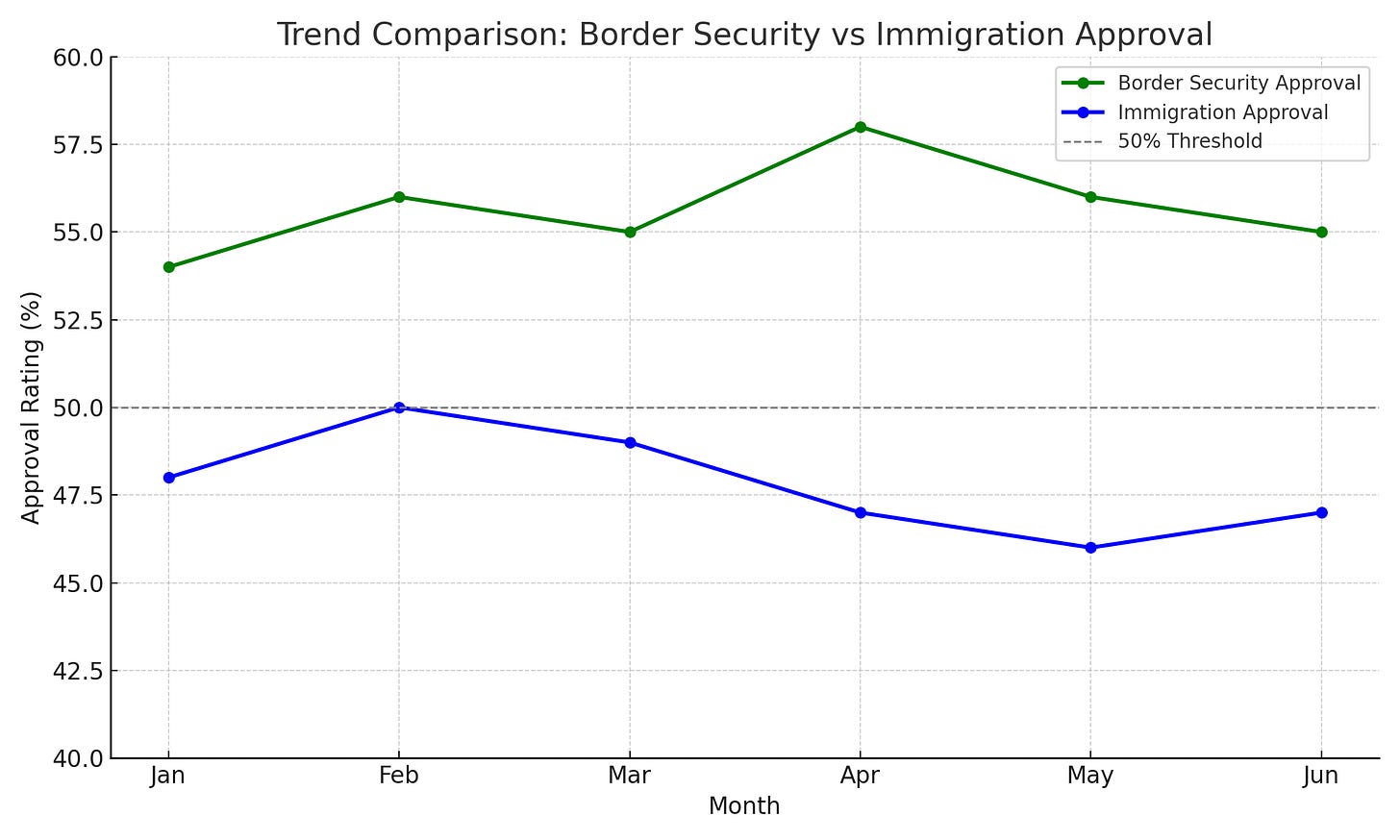Why Do Trump's Immigration Polling Numbers Keep Changing?
The statistical shell game that's hiding what Americans actually think about border security versus deportation policy.
I've been analyzing polling data for years, and I've seen my share of statistical sleight of hand. But nothing quite prepares you for the level of intellectual dishonesty happening right now in how major news outlets and polling organizations are presenting immigration data to the American people.
They're playing a shell game with public opinion.
Here's what's happening: pollsters and media outlets are treating "border security" and "immigration" as if they're the same issue. They're not. And this deliberate (or, at best, lazy) conflation is fundamentally misleading Americans about what their fellow citizens actually believe about one of our most important policy debates.
The smoking gun? The Washington Post recently admitted that "we've seen a remarkable split screen in some of these polls. While people often use 'border security' and 'immigration' interchangeably, Trump is actually in much worse shape when pollsters have tested the latter phrase."
Read that again. They know these are different issues. They know the public responds differently to each. Yet they continue treating them as interchangeable when it suits their narrative.
Two Different Problems, Two Different Solutions
Look, this isn't complicated. Any honest observer can see these represent completely different policy challenges:
Border security is about stopping people from illegally entering the country in the first place. We're talking physical barriers, technology, border patrol agents, stopping drug cartels and human traffickers. It's fundamentally a law enforcement issue, keeping bad actors from exploiting our sovereignty.
Immigration policy is about what we do with the millions of people already here. Deportation procedures, paths to citizenship, workplace enforcement, and what happens to families who've been here for years. This is domestic policy with real civil rights implications affecting actual communities where real people live, work, and raise their kids.
Yet major polling organizations routinely treat these as the same thing, creating confusion that serves everyone except the voters trying to figure out where America actually stands.
The Numbers Don't Lie—When You Ask the Right Questions
When pollsters bother to ask specific questions, the data tells a completely different story than the "immigration approval" headlines suggest.
On border security specifically: Fox News found 55% approval for Trump's border performance. CBS News discovered 64% of Americans credit Trump's policies for the dramatic reduction in border crossings, from 96,000 in December to 12,000 in April. The Marquette Law School Poll showed 56% approval for Trump's handling of "border security."
On immigration enforcement: That same Marquette poll? Trump sits at exactly 50-50 on "immigration"—a full 6-point gap from his border numbers. The Washington Post-ABC News-Ipsos poll found 53% disapproval of Trump's "immigration" handling. Morning Consult showed mixed results with 51% approval and 44% disapproval on immigration, positive numbers that still lag behind his border security ratings.
But here's where it gets really interesting. When Marquette dug deeper into what Americans actually think about deportation, they found something remarkable: 66% support deporting "immigrants who are living in the United States illegally." Sounds like a mandate for aggressive enforcement, right?
Wrong. When they asked about deporting people "even if they have lived here for a number of years, have jobs and no criminal record," support crashed to just 42%.
That's not voter confusion—that's sophisticated public opinion being obscured by lazy polling. (Note: The 24-point gap between these responses is well outside typical polling margins of error, indicating a genuine distinction in public opinion.)
Real People, Real Consequences
This isn't just an academic exercise for data nerds like me. This conflation has serious real-world consequences for how we understand what Americans actually want from their government.
Take Latino voters—the folks who actually live this issue every day. According to Equis Research polling from this spring, Latino voters supported Trump because they wanted border security, but they're now turning against him because of enforcement overreach. As the poll found, "Trump's newest voters expected him to focus narrowly on the deportation of criminals and recent border-crossers and by and large did not support efforts to deport immigrants more broadly."
These voters wanted to stop new illegal immigration. They didn't sign up for immigration raids targeting people who've been here for years, have jobs, and haven't committed crimes. That's a coherent, reasonable position—but it disappears completely when pollsters lump everything under "immigration approval."
By a 66-29 margin, Hispanic voters now believe Trump's "actions are going too far and targeting the types of immigrants who strengthen our nation." They supported stopping illegal border crossings but oppose aggressive enforcement against established communities.
The distinction matters. These are real families, real communities, real consequences.
The Most Dishonest Example Yet
The most revealing case study comes from Reuters/Ipsos polling from May. They found that 55% of Americans support "increasing deportations of immigrants without legal status." Seems like strong support for Trump's approach, right?
But wait—the same poll found that 55% say people suspected of being in the country illegally deserve due process rights, and 48% believe current enforcement efforts "have become excessive."
Those aren't contradictory views. They're nuanced opinions about targets, process, and limits that only become visible when you ask specific questions instead of throwing everything into a generic "immigration" bucket.
Americans are saying: "Yes, deport people who shouldn't be here, but do it fairly and focus on the right people." That's sophisticated thinking that gets completely lost in broad approval ratings.
Where the Media Falls Down
Major news organizations aren't just failing to clarify this distinction—they're actively making it worse. The Washington Post admits they know about the "split screen" phenomenon but continues reporting Trump's "immigration numbers" without consistently separating border security from internal enforcement.
CNN recently reported that "voters are losing confidence in Trump's ability to handle immigration," while citing overall approval numbers. But their own polling showed different results for border-specific questions versus broader immigration queries—a crucial distinction their reporting glossed over.
This isn't about liberal bias or conservative spin. This is about basic accuracy in representing what the data actually shows. When reporters and editors know there's a distinction but choose to ignore it, that's not journalism—it's propaganda.
What Americans Actually Believe
When you cut through the statistical fog and ask people what they actually want, a clear picture emerges:
Americans support strong border security with physical barriers and serious enforcement. They want criminals and recent border-crossers deported. They believe people in removal proceedings deserve basic due process protections. They oppose family separation and targeting established communities. They're skeptical of enforcement in schools and churches.
That's not a contradiction—it's a coherent policy framework that says "stop new illegal immigration but treat people already here with basic fairness."
But this reasonable, nuanced public opinion becomes invisible when everything gets shoved under "immigration approval." The American people are smart enough to distinguish between securing the border and managing immigrant communities. Our pollsters and media need to catch up.
The Path Forward
Here's what needs to happen: Polling organizations need to separate these issues in their surveys. News outlets need to report the distinctions clearly instead of perpetuating false equivalencies. Politicians need to stop using border security success to justify enforcement policies that lack public support.
Most importantly, we owe American voters honest information about where their country actually stands on these issues. The current shell game serves political operatives and lazy analysts, but it betrays the public trust that makes democracy work.
Media outlets and polling firms are attempting to confuse voters with misleading statistics and false choices. The American people deserve better. Border security and immigration policy are different issues. Voters understand the difference. It's time for our pollsters and media to stop pretending otherwise.
For people very concerned that democracy is at risk, they certainly don’t seem to mind misinforming the public.





